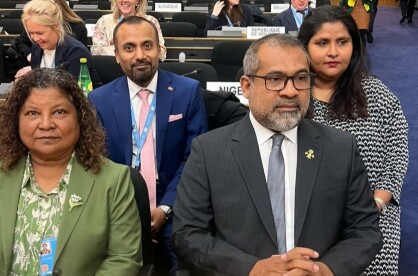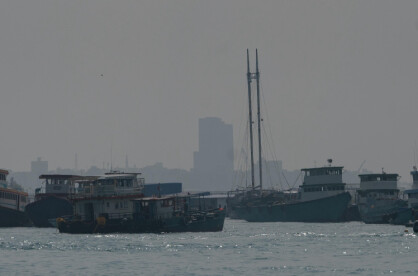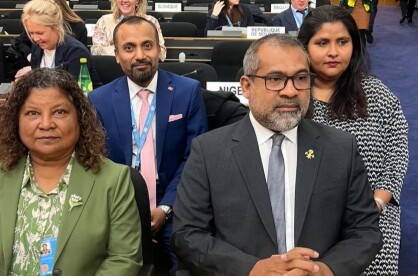Unrealistic new revenue measures will widen financing gap
A need for a better balancing act of expenditure with changes in revenues

A need for a better balancing act of expenditure with changes in revenues

On 25 April 2021 ,the Maldivian parliament, just one day prior to the maturity of an overdraft of MVR4.4 billion [USD285 million]taken by the Solih administration from the Maldives Monetary Authority, approved a one-year extension on the exemption allowing the overdraft from the public bank account. The overdraft was initially issued on April 26, 2020, after temporarily suspending pertaining articles in the Fiscal Responsibility Act, to allow the fiscal space needed to address the recession brought on by the COVID-19 pandemic. This enabled short-term advances from the MMA without limits again, after completely halting such longer term monetisation in 2012. While requesting the extension, Minister of Finance Ibrahim Ameer said that the Maldives was not financially capable of following Article 32 of the Fiscal Responsibility Act, and that attempting to enforce it would result in disruption of the economy and challenges in managing the state's cashflow. So, one may wonder why this was not highlighted by the Minister when presenting the 2021 budget to the Parliament or indeed what fundamentals have changed during the last four months. A more important question remains however; are the revenues forecast in the 2021 budget still attainable? Or are major increases in expenditure expected or is the initial financing plan going off the rails?
In the past, when the government had proposed outrageous new revenues in the national budget at the eleventh hour, the budget had always proved untenable. One such case was the 2008 budget, which resulted in a substantial deficit of 13 percent of GDP as new revenue measures of over MVR2.3 billion (USD180 million), envisaged from payments from the development of a transshipment port and an economic zone in North Ihavandhipolhu, failed to materialise. A similarly substantial amount of MVR3.3 billion (USD212 million), was recorded as new revenue measures in the parliament approved budget for 2021, even though the Ministry of Finance had initially included only MVR1.2 billion (USD79 million).
The huge, and sudden, shift was made by the Parliament even though the Minister of Finance, Ibrahim Ameer, had pled with representatives that it was crucial that the budget be passed without amendments. However, Parliament shoehorned major changes into the budget, and revenues from real estate tourism was increased from MVR154 million to MVR1 billion while proceeds from the sale of land was hiked from MVR300 million to MVR1.5 billion. Other ‘new revenue measures’ included restructuring of airport service charges and airport development fees (MVR272 million), issuance of new islands for resort develop (MVR154 million), the licensing of a new telecom operator (MVR300 million) and introduction of a congestion charge and parking fee (MVR37 million). It was a surprise that discussion on the progress of the new revenue measures were kept ‘hush-hush’ during the deliberation on the extension of the overdraft, since many of these measures required legislative changes.
Apart from issuance of new islands for resort development, there appears to be slow progress on the implementation of the other new revenues measures included in the budget. The Ministry of Tourism had started working on the leasing of new islands for resort development and in April 2021 invited eligible investors, local or foreign, to submit their interest to develop 16 tourist resorts in uninhabited islands in Northern and Southern Maldives. However, given that the world economy is still reeling from the COVID-19, it is questionable if there will be a huge demand to invest in such investments without lucrative concessions. Similarly, one can argue that not much revenue will be generated by the lease of land, under which plans 30 percent of land reclaimed in various regions will be open for tender to parties not resident in those regions. Likewise, the interest of potential foreign investors for developing real estate tourism in the Maldives is also expected to be low due to the weak global foreign investment demand.
Despite projections by the United Nations Conference on Trade and Development (UNCTAD) estimate that the global economy to recover in 2021, investors are likely to remain cautious due to uncertainty over the evolution of the COVID-19 pandemic. Its investment report, published in mid-2020, forecast global foreign direct investment (FDI) to fall by 5 percent to 10 percent in 2021. Similarly, the Kearney Foreign Direct Investment Confidence Index (FDICI), showed a significant fall in overall optimism with high level of risk aversion about the global economy and investors are exercising more caution in gearing up for a long-haul recovery for investments. In addition, Investment Monitor, also showed that tourism FDI (hotels and leisure) is expected to continue to struggle since international visitors’ spending will take time to recover.
The restructuring of airport service charges and airport development fees may also be challenging, since all major airlines are under huge financial distress, and if there are additional costs and capital investment involved of such a change, it could be further delayed with their resistance. The other two revenue measures of licensing of a new telecom operator and introduction of a congestion charge and parking fee may be more viable options but delayed implementation may further reduce the revenue estimated to be generated from them for the year. Under a best case scenario, the government may be able to generate about MVR1.6 billion out of the MVR3.3 billion budgeted for 2021.

Further risks are posed to both tax and non-tax revenues due to new variants of the COVID-19 pandemic. Weekly and monthly data already indicates such a decline. Monthly data showed that, during the first two months of 2021, overall total revenue and grants declined by 18% compared with the same period in 2020. As per weekly data as at 15 April 2021, total revenue and grants declined by 9% annually. This was due to a fall in the tax revenue by 9% while non-tax revenue also declines by 7% annually. Likewise, compared to the same period last year, the total grants which represented 11% of the budget, declined by more than 50% or by US$12 million. On an annual weekly average, there is a shortfall of total revenue and grants by more than 20% compared to 2020 and has not recovered to the level of last year.
Such decline in government revenue reflect the sluggish growth in the real economy, especially in the tourism sector although the sector has shown signs of rapid recovery. Recent data indicates that total arrivals for Jan-Mar 2021, had declined by more than 20% compared to the same period last year. Furthermore, after a decline of 29% in real GDP in 2020, the Ministry of Finance projected that it will grow by zero percent during first quarter of 2021 with a positive growth only expected from the second quarter onwards. However, an addition risk factor for GDP growth has materialized. The Maldives' number one market, India, with a share of over 22% is grappling to contain COVID-19, with sky-rocketing infection rates. And on 25th April, Germany and South Korea joined the list of countries closing their borders to India amid growing international concern over the B.1.617 coronavirus variant. There may be pressure on the Maldivian government to restrict tourists from India as well.
Consequently, based on past experiences, the overall impact of all these factors will be a larger budget deficit. Based on the monthly and weekly data, total expenditure has been kept at almost the same level as in 2020, although there is a slow decline of 4% annually, and total expenditure recorded MVR7.5 billion at the end of 15 April 2021. However, with total revenue and grants totalling MVR5.4 billion, this means that there already is a budget deficit of MVR1.8 billion at the end of 15 April 2021. And if expenditures are not matched, there is high probability for the fiscal deficit to rise above 18.5% of GDP. Based on the current trends, a budget deficit of over 25% GDP in 2021 is a possibility, without any policy changes. This would raise further financing issues for the Minister of Finance and again the only option may be additional borrowing from MMA of over MVR4 billion which would not be sustainable, adding further debt to already high public debt of over MVR86 billion (149% of GDP) or per capita debt of over US$10,000. Hence, there is an urgent need to review prudently the new revenue measures of MVR3.3 billion by the parliament and bring it down to a more realistic forecast and ensure constant review of its progress is monitored. On the flip slide, the expenditure also need to be curtailed as much as possible.
In a world where even the most prudent developed countries are ripping up the rulebook and running fiscal expansion to cope with the coronavirus pandemic, often politicians have argued why the Maldives must not follow. The problem in countries such as Maldives as argued by Alberto Alesina, one of leading political economist of his generation at Harvard University, was that once public spending had gone up, people’s expectations changed, making it difficult to bring it down again. This is evident from Maldives fiscal position during the last 10 years as total government budget expenditure has never come down below 30% of GDP. Alberto Alesina also wondered whether coalition governments, which are more common under proportional representation, found it more difficult to shrink budget deficits because they had to cater to vested interests. He also argued that political polarisation may have allowed governments to feel little guilty or compunction in leaving a mess for their successors to clear up. Since without vigilance, the logic of politics encourages unsustainable fiscal policy, the question is who ultimately takes responsibility of such fiscal irresponsibility, should it be the Finance Minister or the President. For now, it seems no one is coming forward, and the future generation may face the consequences and may have to take the brunt of our irresponsibilies unless major radical change takes place.



